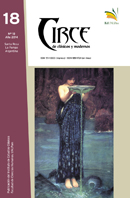Passions and words. On Aristotle’s political theory
Keywords:
Aristotle, Plato, politics, rhetoricAbstract
As on a person’s psychology, there are in the pólis two opposing principles, passions and law. In gregarious animals, there is also a political factor that leads many individuals to work for a common purpose. But in man there is a difference in his political activity, i.e., the law that comes from reason and cannot be expressed without words. For this reason, Aristotle, unlike Plato, gives a constructive function to Sophists, as experts on rhetoric, which is necessary to establish law in the city. Politics is a superior science that articulates ethics and rhetoric in order that men in the city can reach the ultimate goal, happiness. For Aristotle, there is not an external metapolitical objective, which could separately satisfy the upper components of the human psyche.
Downloads
Downloads
Published
Issue
Section
License
Los autores que tengan publicaciones con esta revista, aceptan los términos siguientes referidos a los derechos de autor/a:
1. Los autores/as conservarán sus derechos de autor y garantizarán a la revista el derecho de primera publicación de su obra, el cuál estará simultáneamente sujeto a la Licencia de reconocimiento de Licencia Creative Commons Atribución-NoComercial-CompartirIgual 4.0 Internacional (http://creativecommons.org/licenses/by-nc-sa/4.0/). que permite a terceros compartir la obra siempre que se indique su autor y su primera publicación esta revista. El autor es el titular del copyright.
2. Los autores/as podrán adoptar otros acuerdos de licencia no exclusiva de distribución de la versión de la obra publicada (postprint) siempre que se indique la publicación inicial en esta revista. La cesión de derechos no exclusivos implica también la autorización por parte de los autores para que el trabajo sea depositado en el repositorio institucional y difundido a través de las bases de datos que el editor considere adecuadas para su indización, con miras a incrementar la visibilidad de la publicación y de sus autores.
3. Se permite y recomienda a los autores/as difundir su obra a través de Internet antes y durante el proceso de envío, lo cual puede producir intercambios interesantes y aumentar las citas de la obra publicada.







.jpg)









2.png)



